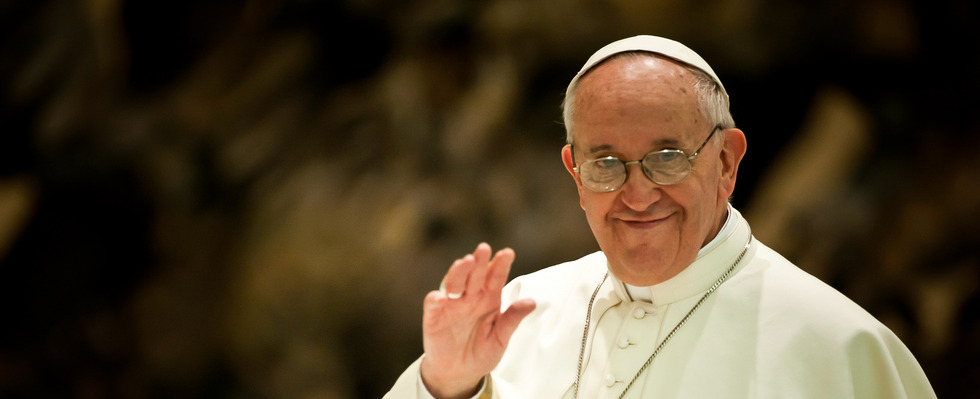On the Extraordinary Holy Year of Mercy
PASTORAL LETTER
Bishop Mark Davies of Shrewsbury FAITH MAGAZINE July - August 2015
My Dear Brother and Sisters,
I write to you on this Divine Mercy Sunday with the happy news that Pope Francis formally announces today a “Holy Year of Mercy” to begin on 8 December 2015 under the patronage of Mary, the Mother of Mercy. The message of mercy has been central to Pope Francis’s pontificate, as it was to that of Saint John Paul II, who inaugurated this Sunday after Easter as Mercy Sunday and who canonised the Polish visionary of God’s mercy, Saint Faustina Kowalska.
As we prepare for this Holy Year, it is important to remember God’s mercy is his unfailing attitude and actions towards the least deserving, and especially the spiritually poor. Mercy never abandons us in the misery of our sins by pretending sin doesn’t matter. This is not the mercy of God. We may easily give up on each other and believe ourselves incapable of the call to holiness; but God never ceases to call us and to offer us his grace, which is “the free and undeserved help that God gives to those who respond to his call” (CCC 1996). In the Gospel we see how Christ does not give up on Saint Thomas, despite all his refusals to accept Divine mercy (cf Jn 20:19-31). Likewise, Our Lord will never cease to call each of us to rise again from wherever sin has brought us down.
Our Christian life begins with an act of mercy, an act of rescue in baptism. And this work of rescue becomes the pattern of our life in Christ. Since our Christian lives are always lived at a crossroads, the Catechism states: “There are two ways: the one of life, the other of death” (CCC 1696). In the readings at Mass today Saint John tells us that loving God is keeping his commandments, “and his commandments are not difficult, because anyone who has been begotten by God has already overcome the world; this is the victory over the world – our faith” (1 Jn 5:3-4). The Church always puts before us the distinction between the way of Christ leading to life and the false path which leads to death. However, God’s mercy does not abandon us even if we follow the lure of the false path. His mercy goes before us; it also follows us, as Saint Augustine taught. This call is compared in the Catechism to “Jesus’ look of infinite mercy” that “drew tears of repentance from Peter”. It is this gaze of love that leads each of us through a process of “uninterrupted” conversion as God makes our hearts new (see CCC 1428-1432). The sacrament of penance and reconciliation entrusted to the Church on Easter day is the merciful means by which we continue to choose life and bring all of our unruly thoughts, words and actions into conformity with Christ. We must give thanks today for this great Sacrament of Mercy!
The Father of Mercies continues to rescue us and helps us conform our thoughts, our words and our actions to the life of his Son, since it is only in this Divine life that we can ultimately find happiness. At the same time the Church teaches us how the gift of the Holy Spirit “renews us interiorly…” and “enlightens and strengthens us to live as ‘children of light’ through ‘all that is good and right and true’” (CCC 1695). Mother Church also sets before us a well-established path so we may unite ourselves to Christ and follow this way of mercy: the path is called the “works of mercy”. The works of mercy help us respond to the generous mercy of God. Many of us will have been taught them from our earliest years and we will return to them in the Holy Year ahead. The seven corporal works of mercy are:
1. Feed the hungry.
2. Give drink to the thirsty.
3. Clothe the naked.
4. Shelter the homeless.
5. Visit the sick.
6. Visit the imprisoned.
7. Bury the dead.
And the seven spiritual works of mercy are:
1. Counsel the doubtful.
2. Instruct the ignorant.
3. Admonish sinners.
4. Comfort the afflicted.
5. Forgive offences.
6. Bear wrongs patiently.
7. Pray for the living and the dead.
These works mark out the path by which we must each seek to be merciful “as our Father is merciful” (Lk 6:36). On this Sunday of Divine Mercy – as we look forward to the Holy Year of Mercy – may we know in our lives the mercy of God and be able to wholeheartedly repeat that simple prayer of Saint Faustina: “Jesus, I trust in you.”
Wishing you the great joy of Easter,
Bishop Mark Davies of Shrewsbury, 12 April 2015






